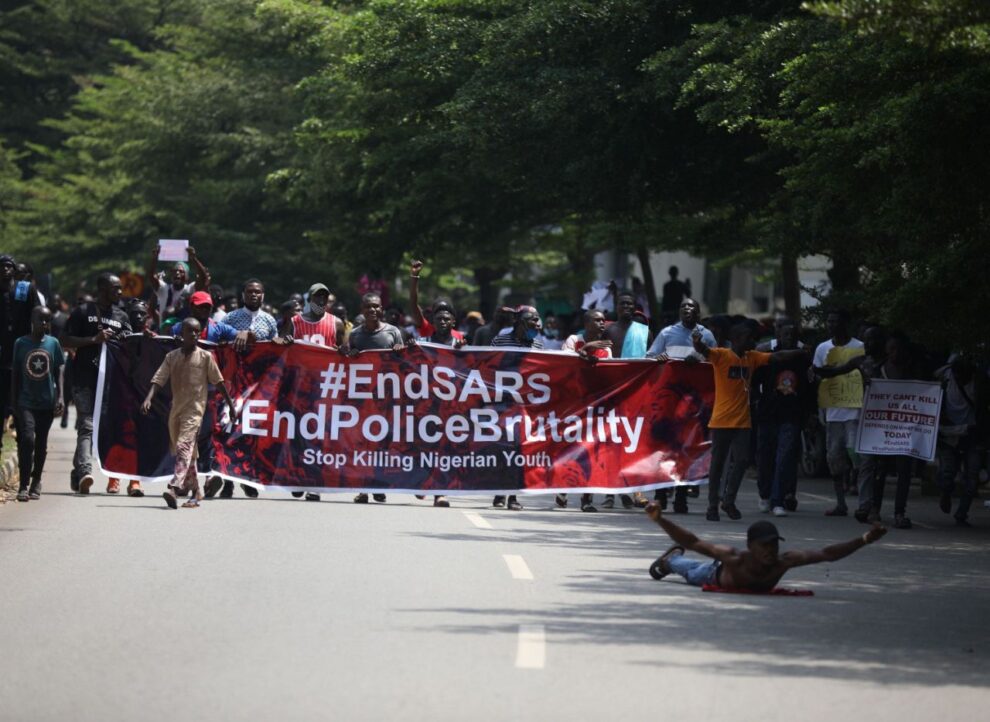
(Bloomberg) —
Nigerian security forces opened fire on protesters in Lagos before a lockdown was imposed on Africa’s most-populous city to quell growing rallies against police brutality in the OPEC nation.
A Nigerian Red Cross Society official said at least two civilians were shot dead, adding to at least six other deaths in the country on Tuesday. Lagos state Governor Babajide Sanwo-Olu said 25 people were in the hospital after the incident, which he blamed on “forces beyond our direct control,” as his government said it’s investigating what happened.
In a series of tweets on its Twitter page, the Nigerian Army labeled reports that soldiers had fired on protesters as fake news. Spokespeople for the army and the police didn’t immediately answer calls by Bloomberg seeking comment.
The escalation of violence came hours after Sanwo-Olu announced a 24-hour curfew to try and end disruptions in a region that’s home to more than 22 million people and houses the headquarters of Nigeria’s biggest banks and largest companies. Before Tuesday, the protests had been largely peaceful, with the government issuing a directive to its security forces not to use violence.
The events in Lagos drew criticism from U.S. political leaders including presidential candidate Joe Biden, who urged President Muhammadhu Buhari to end the violent crackdown on protesters. Former Secretary of State Hillary Clinton echoed the call.
Key Demands
The demonstrations that began on Oct. 5 have continued despite the government bowing to a key demand of protesters — the dissolution of a police unit accused of brutality. Thousands of mainly young people have taken to the streets of Abuja, the capital, Lagos and other towns, sealing off major roads and bridges, disrupting flights and bringing many businesses to a standstill.
Amnesty International estimates that at least 18 have died so far in the protests.
The Lagos lockdown was imposed after two police stations were torched and a major expressway linking the main port city to the northern and southeastern parts of the country was sealed off. Police Inspector-General Mohammed Adamu ordered the deployment of anti-riot police to protect lives and property.
In the northwestern Kano state, eyewitnesses said at least two women were killed, a number of cars torched and several buildings vandalized after armed men attacked protesting youths. Habu Sani, the state police commissioner, confirmed that the demonstration had turned violent and five people had been hurt before calm was restored, but said no fatalities had been reported.
Security Forces
Most previous uprisings in Nigeria have been quashed by the security forces. The scale of the current protests and the fact that they have been organized on social media with no clear leaders have made them difficult to quell.
Despite the government directive to the military not to use violence, Amnesty International accuses the security forces of using deadly force, including in the Lekki toll gate incident on Tuesday.
The demonstrations have cost Nigeria’s economy about 700 billion naira ($1.8 billion), according to the Lagos Chamber of Commerce and Industry. It called for grievances to be addressed through dialogue, and for an end to the series of marches and street blockades that have spread to about half the nation’s 36 states.
“Over the past 12 days, economic activities have been crippled in most parts of the country,” the chamber said in a statement. “There is a great risk that the situation may degenerate into a case of the complete breakdown of law and order.”
Economic Impact
Nigeria’s oil industry — Africa’s biggest and the mainstay of the economy — has been unaffected, and yields on the nation’s dollar bonds have ticked up since they began, indicating that investors aren’t unduly concerned.
The fallout will worsen if the unrest drags on and violence that has erupted in recent days intensifies, according to Mosope Arubayi, chief economist at Vetiva Capital in Lagos.
“Locals could be scared to go to work and foreigners will fear for the security of their investment,” he said. “This will have a dire impact on the level of economic activity in the country and existing foreign investors could start exiting their position in the capital market.”
The unrest has weighed on insurance companies, whose shares accounted for three of the five biggest declines on Nigerian Stock Exchange on Tuesday. An industry index fell 1.2%, the most in a week.
“Insurance stocks are the most vulnerable” if there’s more violence and property is damaged, said Tajudeen Ibrahim, an analyst at Chapel Hill Denham Securities in Lagos.
(Updates with army comment on shootings in third paragraph.)
For more articles like this, please visit us at bloomberg.com
Subscribe now to stay ahead with the most trusted business news source.
©2020 Bloomberg L.P.





